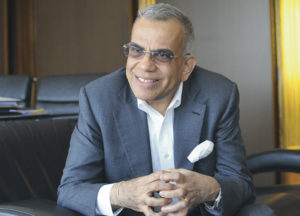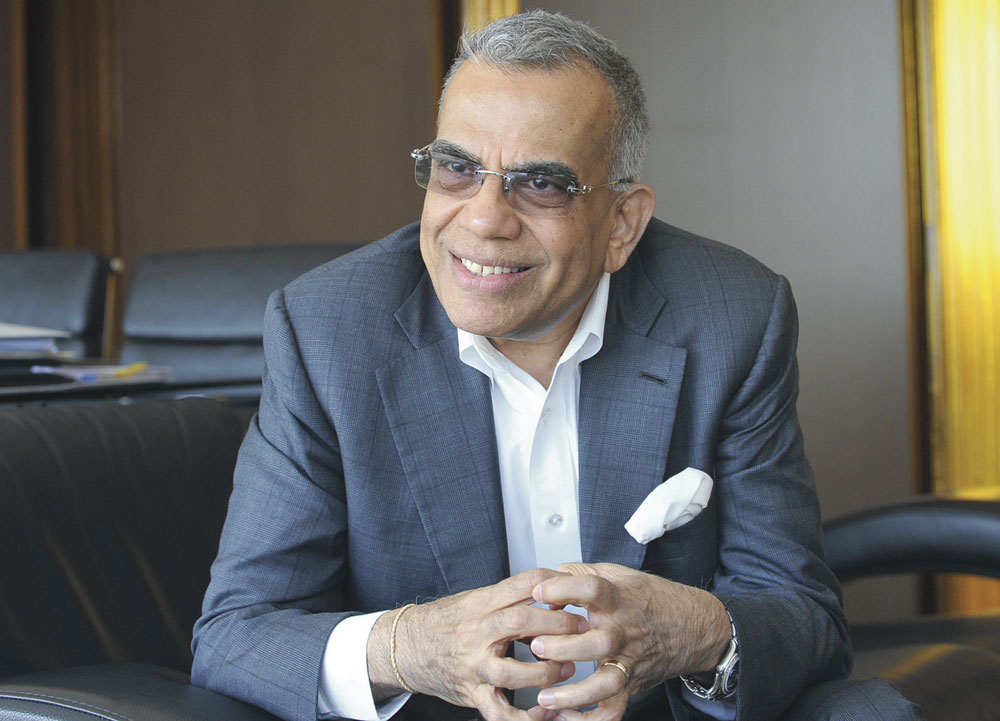An Inevitable Cycle: Interview with PNC Menon, Sobha Group
“Real estate is a very cyclical business,” PNC Menon, chairperson of Sobha Group observes. Since the oil price drop, the GCC has been going through a slowdown in various sectors, but according to the chairperson this would be true regardless of the oil slump. He says that ups and downs are common in any business especially real estate. Dubai, he observes, goes through a four-year cycle which includes two years of positive and two years of negative. “Considering the negative hit us in 2014, we should be ending the negative cycle by more or less the end of this year.”
He admits that when is difficult to really map out, but he explains that the cycle is somewhat inevitable and existent in every market. “This kind of cyclical periods in real estate is all over the world, not just in Dubai. I was recently reading about the US, and quite strangely the US has been going through positives for the last eight years. This is quite unusual.”
He says cycles are very difficult to figure out. It is very dynamic and has become even more so since the financial crash in 2008, which he says is when the whole world changed.
He asserts that the global phenomenon affected Dubai in many ways. But when it comes to the oil slump, he says that looking at the fundamentals I don’t think it could affect Dubai as much. “Dubai is not really an oil and gas economy. The UAE, too, as a whole does not only depend on oil.”
When it comes to the future of oil prices, Menon predicts that the oil price would probably

PNC Menon
stay between $40 to $60 per barrel.
He urges that it is impossible to truly predict the future. “There could be a technological breakthrough that could change the economy and the minds of people.”
He believes with good management and the advance human resources available in the GCC, the region would be able to engineer an alternative and reduce its dependency on oil.
He admits that GDP is extremely critical, but he argues that the element of oil in the GDP is absolutely negligible. “It is not an oil economy. What Dubai has created in terms of infrastructure has become a magnet for people from the surrounding regions to come on a holiday, to come shop, and even to come live.
“I am a strong believer of Dubai, not just today but also back during the financial crisis, I used to say ‘this city cannot be stopped.'”
Menon admits that the financial crisis in a way opened the minds of businessmen around the world.
Personally he learnt a lot about leveraging. He says that there was this unspoken belief in the market that leveraging has to always be limited. “In the real estate and construction industry, I think it is best to have a debt equity ratio of about 40:60 rather than the other way around.”
He explains that the industry is cyclical in nature anyway, so a good company would be wise to target 40% debt and 60% equity. “This, in my opinion, would really help during the pressures of the negative cycle and would protect your business.
“The year 2008 financial crisis was a beautiful lesson on sustainability of a business. You can be successful one year and not the other.”
What is more important is to sustain, he says. “If you want to target a sustainable business in the real estate domain, financial discipline of a good debt equity ratio would really pull yourself out of the negative cycles smoothly and help you sustain your business.”
Venturing into affordable projects
The group made a move into the affordable sector last year. Menon says that the reason Sobha, a primarily luxury brand, is considering this is because of the different kinds of buyers in the market. Some buyers are interested in luxury while others in affordable. “There are different kinds of budgets: high-end, mid-end and low-end, in every market even the GCC. We need to cater to all kinds of demand.”
He explains: “Luxury and affordable projects are not the same, specifications for the low-end would be lesser than the high-end. But the quality will be very good either way because that is our philosophy.”
In delivering any project, Menon says that Sobha’s strongest point is that is a totally backward integrated company. “What I mean by that, is that we have got our own contracting company, our own design studio, we do our own engineering, we pretty much do everything under one umbrella. This makes it easier for us, and it gives us a lot of control in terms of time and quality.”
These two aspects, time and quality, are critical in development, says the chairperson.
The multinational group has various developments and investments in the UAE, Oman, Qatar, Bahrain, Brunei and India.
Menon has especially been focussed on Dubai. He says: “If you look at this city, it is really a magnet for the three billion people living in and around it which includes surrounding regions such as the whole of Africa, Middle East and the Indian subcontinent. All put together, there are three billion people easily live in this region, which is roughly about more than 40% of the world population. I don’t think any other country has created a city like this till today in this geography, nor do I see the possibility of that happening in the next ten years.”
He praises the Prime Minister of UAE H.H. Sheikh Mohammed bin Rashid Al Maktoum for the development of such an incomparable city.
The Dubai-based entrepreneur has multiple businesses overseas but makes sure he travels not more than 120 days in a year, leaving the rest two-third of his time in the UAE.
Sobha has been running projects worth $12bn in Dubai and plan to add another $12bn during the course of this year.
Looking at other markets in the region, Menon says Iran has been an interesting new addition to the region’s property market. After sanctions were lifted earlier this year, many groups have been showing avid interest in endorsing the country. Menon says that Sobha too has definitely been looking into Iran, though since the country has just stepped out now he thinks it’s better to wait and watch before making a move.
He reveals that the group has made a decision to not look at any new destinations, other than the UK, till the beginning of 2018. He says: “The reason behind this is because I think it is time to consolidate the business. I am 67 years old, it’s time.”
Back to Indian roots
Sobha Group has also made huge progress Menon’s home country, India, where his son is currently the chairperson of the company.
Menon says that India too has a cyclical nature. “It doesn’t matter if you are in India, New York, or Dubai, it is the same case everywhere. This is what I call the unfortunate part of the business.”
He emphasises that businessman need to start accepting it rather than trying to combat it. By preparation to deal with negative cycles businesses could do better.
In terms of India, Menon says that it’s economy is doing pretty well keeping in mind the large amount of population it has to tackle. “I think the Indian economy is going to do exceedingly well especially for the next three years to come. The projection is that India is going to be one of the strongest economies of the world even more than China. They say that the US, China and India will be the strongest economies in the next 25 to 30 years.”
UAE is one the biggest trading partners with India. Menon says that the relationship between the two nations is only going to get better because of the growing interest to work together. “The historical relationship with the two countries also plays a strong role. All of it together is going to add a lot of benefit to both the countries. I think over a period of time there is going to be a lot more investments with India becoming an opportune investment destination. This will be hugely beneficial for both the countries.”
Man behind the scene
Back in 1974, he moved to Oman with roughly $7 in his pocket and a powerful drive to prove himself.
Menon says: “When you have no money, you can’t imagine the struggle. The first two to three years was really a testing period. Unless you have the resilience to go through it, it is not easy.”
In 1976, Menon established an interior decoration firm under the name of Services and Trade Company in Muscat. His fit-out business then slowly propelled from basic fit-outs for offices to competing (and winning) against European firms to do the fit-out of palaces and mosques. “I was always different from others, in the business it was the quality of our work that stood out.”
While talking about succeeding in life, Menon believes that you are either born with it or not. “It is in your DNA, and you either need the opportunity to prove it or create your own opportunity.”
Running a business on the other hand needs skills, he says. “Each entrepreneur needs the right business skills to take it further, and also a philosophy. That could be different for each individual because people believe in different things, methods, and schools. My belief is that quality is the most important requirement and main strength.”
At the age of 67 and retirement not at all on his mind, Menon says that today he still has dreams to pursue more. He aims to start up another business with a professional team and achieve a target of $2bn and also concentrate more on his philanthropy. The businessman says he has committed half of his wealth to society and has big dreams primarily in building education institutes in the near future.
He emphasises that as long as he has the health and breath of life, he will continue to work, create and thrive.





